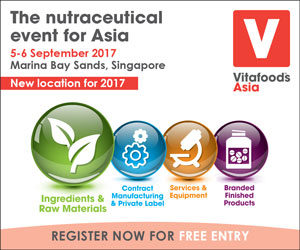Vitafoods Asia 2017: Industry Players Optimistic of Future
Next month, Asia’s nutraceutical, functional food and beverages, and dietary supplement industries will gather in Singapore for Vitafoods Asia, the region’s only event dedicated to these markets. The organisers reached out to exhibitors and visitors[1] last month to get their thoughts on how the industry was doing, and some interesting insights were uncovered.
Asian Nutraceutical Industry Still Going Strong
Despite what crowd sentiment and ‘common sense’ say about the global economy, both exhibitors and visitors expressed positivity about the future of their companies. More than 80% of those surveyed said that they were optimistic about the sales performance and profitability of their businesses. And according to Allied Market Research[2], the global nutraceuticals market size is expected to reach $302,306 million by 2022, with a CAGR of 7.04% from 2016 to 2022, and Asia Pacific is expected to surpass the global growth average with a CAGR of 7.33%, making noteworthy contributions to the global market.
Nutraceutical Product Categories of Most Interest
The top 5 categories that were most important to exhibitors’ and visitors’ businesses were Cardiovascular Health, Digestive Health, General Wellbeing, Healthy Ageing, and Immunity. When asked about his opinion on what’s trending, Prof. Chin-Kun Wang, President of the International Society of Nutraceuticals and Functional Foods, shared, “The emphasis on microbiota is increasing – most people understand the link between health and gut microflore. Prebiotics and probiotics have become key ingredients in nutraceuticals and functional food. Gastrointestinal (GI) health has become an important issue in Asia as economic growth, social stresses and dietary behaviours continue to influence health. GI health products will continue to develop and we will see many innovative prebiotics and probiotics in 2018.”
Prof. Wang will lead several discussions at the Life Stages Theatre, and speak in the Digestive Health and Microbiome Summit this year.
Top 3 Trends Companies are Watching
Those surveyed unanimously concur that scientifically-proven claims, personalised nutrition, and clean label are the Top 3 trends that their companies are keeping a keen eye on. As consumers grow in sophistication and awareness of food options, they seek out products that specifically and effectively address their needs. Products with ‘unrecognisable’ ingredients are deemed less desirable, as consumers prefer to know exactly what they eat and drink.
Commenting on what happened earlier this year in Singapore’s infant formula industry, Mr Nicholas Lauw, Partner at Rajah and Tann, and Member of Lifesciences Asia Pacific Network (LAN), said, “What started as public backlash over the cost of milk formula resulted in a governmental review of the way milk formula companies advertise and market their products. The effect of this was a tightening of the regulations that stipulate what milk formula companies are able to say about their products on their packaging, and close scrutiny of the way they arrange tie-ups with hospitals. Producers of other nutraceutical and functional food products should take into consideration how quickly the Singapore government has stepped in to act in the face of public backlash on milk powder pricing, and pre-emptively review their own advertising and marketing practices.”
Nicholas Lauw will be speaking at the Life Stages Theatre and the Regulation and Ingredient Registration Masterclass this year.
More Clarity for ASEAN Economic Community (AEC) Harmonisation of Standards
Overall, the survey participants are appreciative of the move to establish a common standard across the ASEAN region. More than 70% of those who responded found the AEC Harminisation helpful for their business. That said, many of them also expressed that they were not clear of the details, and that a greater awareness of the AEC standards was necessary. Manufacturers were most concerned about the area of health claims regulations, as they need to be able to confidently put forth health claims for their products. Clarifying technical parts of the harmonisation is an important hurdle that the industry must cross, but perhaps, what’s most vital to the companies involved is – “How does the AEC Harmonisation really impact my business on the ground?”
Chris Lee, Managing Director, Global Health & Nutrition Network, concluded, “We look forward to bringing everyone together and facilitating meaningful conversations – ones of business discussions, and of important challenges that affect the nutraceutical industry as a whole. Together, we can impact the industry’s future through a collective voice.”
Vitafoods Asia 2017 takes place from 5 – 6 September at the Sands Expo and Convention Centre at Marina Bay Sands.



